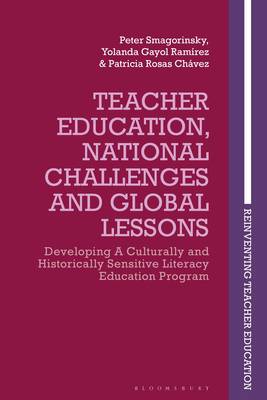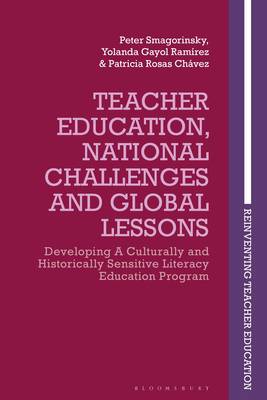
Bedankt voor het vertrouwen het afgelopen jaar! Om jou te bedanken bieden we GRATIS verzending (in België) aan op alles gedurende de hele maand januari.
- Afhalen na 1 uur in een winkel met voorraad
- In januari gratis thuislevering in België
- Ruim aanbod met 7 miljoen producten
Bedankt voor het vertrouwen het afgelopen jaar! Om jou te bedanken bieden we GRATIS verzending (in België) aan op alles gedurende de hele maand januari.
- Afhalen na 1 uur in een winkel met voorraad
- In januari gratis thuislevering in België
- Ruim aanbod met 7 miljoen producten
Zoeken
Developing Culturally and Historically Sensitive Teacher Education
Global Lessons from a Literacy Education Program
€ 254,45
+ 508 punten
Omschrijving
This volume explores the literacy education master's degree program developed at Universidad de Guadalajara in Jalisco, Mexico, with the aim of addressing the nation's emerging social, economic, technological, and political needs. Developing the program required taking into account the cultural diversity, historical economic disparities, indigenous and colonial cultures, and power inequities of the Mexican nation. These conditions have produced economic structures that maintain the status quo that concentrates wealth and opportunity in the hands of the very few, creating challenges for the education and economic life for the majority of the population. The program advocates providing tools for youth to critique and change their surroundings, while also learning the codes of power that provide them a repertoire of navigational means for producing satisfying lives.
Rather than arguing that the program can be replicated or taken to scale in different contexts, the editors focus on how their process of looking inward to consider Mexican cultures enabled them to develop an appropriate educational program to address Mexico's historically low literacy rates. They show that if all teaching and learning is context-dependent, then focusing on the process of program development, rather than on the outcomes that may or may not be easily applied to other settings, is appropriate for global educators seeking to provide literacy teacher education grounded in national concerns and challenges. The volume provides a process model for developing an organic program designed to address needs in a national context, especially one grounded in both colonial and heritage cultures and one in which literacy is understood as a tool for social critique, redress, advancement, and equity.
Rather than arguing that the program can be replicated or taken to scale in different contexts, the editors focus on how their process of looking inward to consider Mexican cultures enabled them to develop an appropriate educational program to address Mexico's historically low literacy rates. They show that if all teaching and learning is context-dependent, then focusing on the process of program development, rather than on the outcomes that may or may not be easily applied to other settings, is appropriate for global educators seeking to provide literacy teacher education grounded in national concerns and challenges. The volume provides a process model for developing an organic program designed to address needs in a national context, especially one grounded in both colonial and heritage cultures and one in which literacy is understood as a tool for social critique, redress, advancement, and equity.
Specificaties
Betrokkenen
- Uitgeverij:
Inhoud
- Aantal bladzijden:
- 352
- Taal:
- Engels
- Reeks:
Eigenschappen
- Productcode (EAN):
- 9781350147430
- Verschijningsdatum:
- 17/09/2020
- Uitvoering:
- Hardcover
- Formaat:
- Genaaid
- Afmetingen:
- 156 mm x 234 mm
- Gewicht:
- 666 g

Alleen bij Standaard Boekhandel
+ 508 punten op je klantenkaart van Standaard Boekhandel
Beoordelingen
We publiceren alleen reviews die voldoen aan de voorwaarden voor reviews. Bekijk onze voorwaarden voor reviews.








